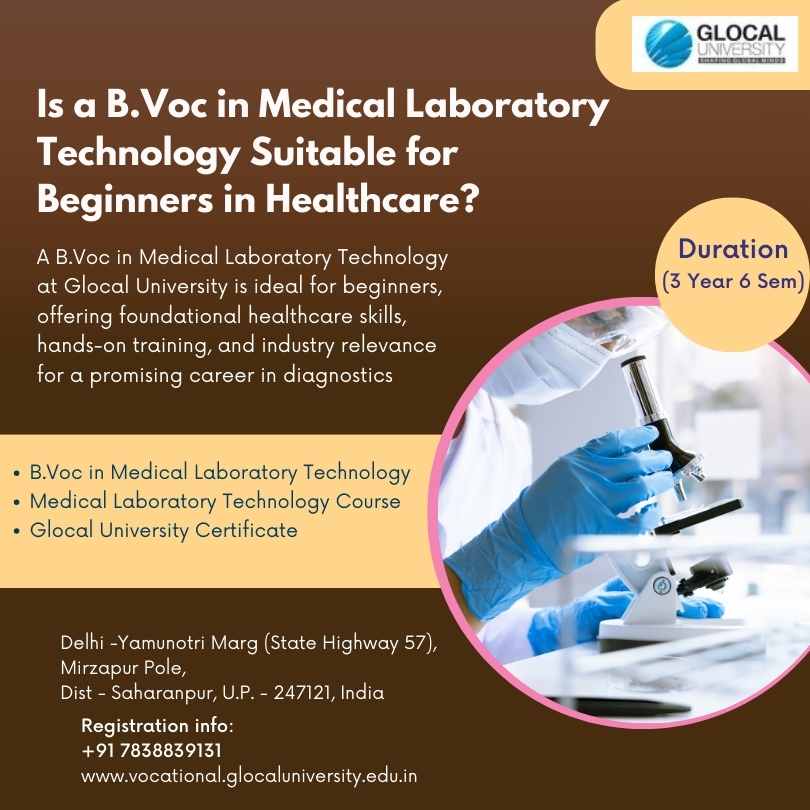Embarking on a career in healthcare can be daunting, especially for beginners. The industry demands specialized skills, technical knowledge, and hands-on experience to thrive. For those looking to enter this rewarding field without prior experience, a B.Voc in Medical Laboratory Technology (MLT) serves as an ideal starting point. This vocational course equips students with the theoretical and practical expertise needed to work as medical laboratory professionals, providing a solid foundation for a promising career in healthcare.
Here’s an in-depth look at why a B.Voc in Medical Laboratory Technology is an appropriate choice for beginners.
What is a B.Voc in Medical Laboratory Technology?
The B.Voc in Medical Laboratory Technology is a three-year vocational degree program that combines academic learning with practical training. It focuses on diagnostic procedures, laboratory techniques, and the operation of medical equipment. Students learn how to collect and analyze samples, perform tests, and ensure the accuracy of results. The program is designed to prepare students for roles in hospitals, diagnostic labs, blood banks, and research facilities.
Unlike traditional degrees, the B.Voc program emphasizes practical knowledge and industry readiness. Beginners are introduced to the basics of medical science and laboratory procedures before progressing to advanced topics like microbiology, hematology, and immunology.
Why is B.Voc in Medical Laboratory Technology Suitable for Beginners?
1. Beginner-Friendly Curriculum
For individuals with little or no background in healthcare, the B.Voc in MLT provides a step-by-step learning approach. The curriculum starts with foundational subjects such as human anatomy, physiology, and basic laboratory practices, gradually moving to advanced diagnostic techniques and quality control measures. This makes it accessible for beginners while still offering depth for career growth.
2. Practical Training
One of the standout features of the B.Voc in Medical Laboratory Technology is its emphasis on hands-on training. Students gain real-world experience in fully equipped laboratories and diagnostic centers. This practical exposure helps beginners understand how to handle sophisticated diagnostic tools and ensures they are job-ready upon graduation.
3. Flexible Career Pathways
A B.Voc in MLT is more than just a degree; it’s a gateway to numerous career opportunities. Graduates can work as laboratory technicians, diagnostic assistants, or quality control analysts in healthcare facilities. For those aiming higher, the program provides a strong foundation for pursuing advanced studies or certifications in medical technology.
Read Also: Which Vocational Courses in Paramedical Focus on Laboratory Technology?
Comparison with Other Healthcare Courses
Diploma in Medical Laboratory Technology (DMLT)
A Diploma in Medical Laboratory Technology is a shorter program, typically lasting 1–2 years. While it covers the basics of laboratory procedures, it lacks the depth and scope of a B.Voc in MLT. The latter offers a more comprehensive curriculum, including advanced diagnostic techniques and managerial skills, making it a better option for long-term career prospects.
Degree in Medical Laboratory Technology
A traditional degree in medical laboratory technology is often more theory-heavy and requires a longer time commitment. The B.Voc in MLT, on the other hand, focuses on practical skills and industry exposure, allowing students to enter the workforce sooner.
MLT Course or Vocational Training
Short-term vocational courses in medical laboratory technology offer quick entry into the field but may not provide the same level of career advancement as a B.Voc. Vocational training is an excellent supplement but lacks the holistic training and recognition of a degree program.




